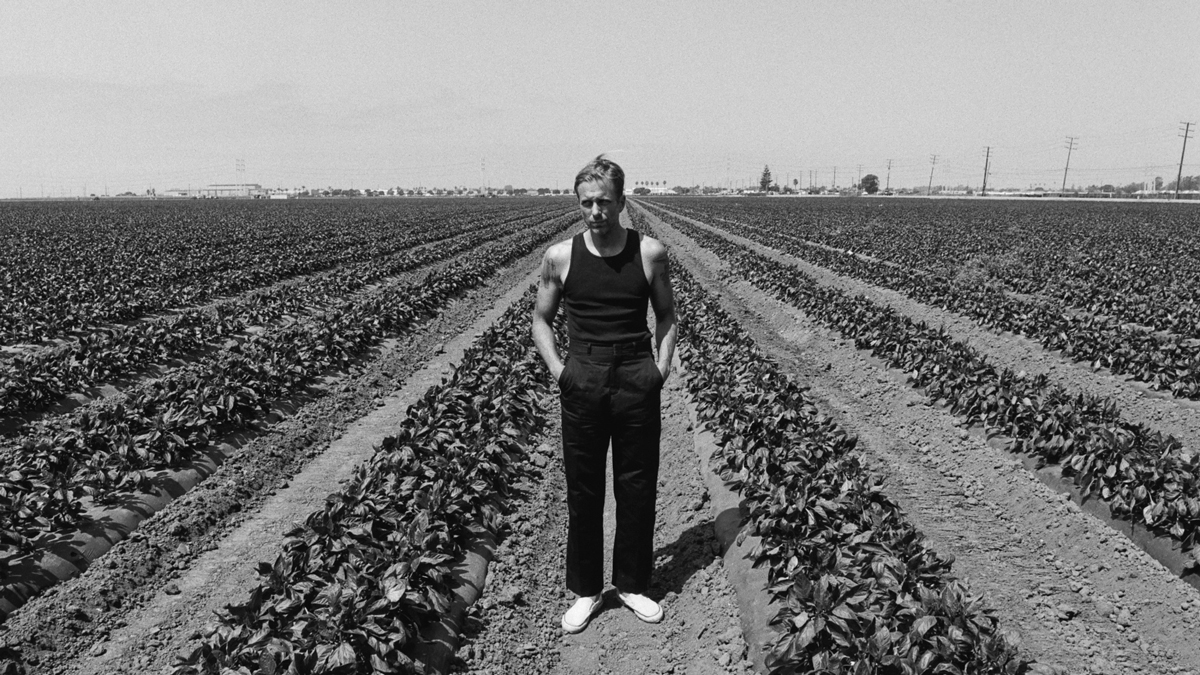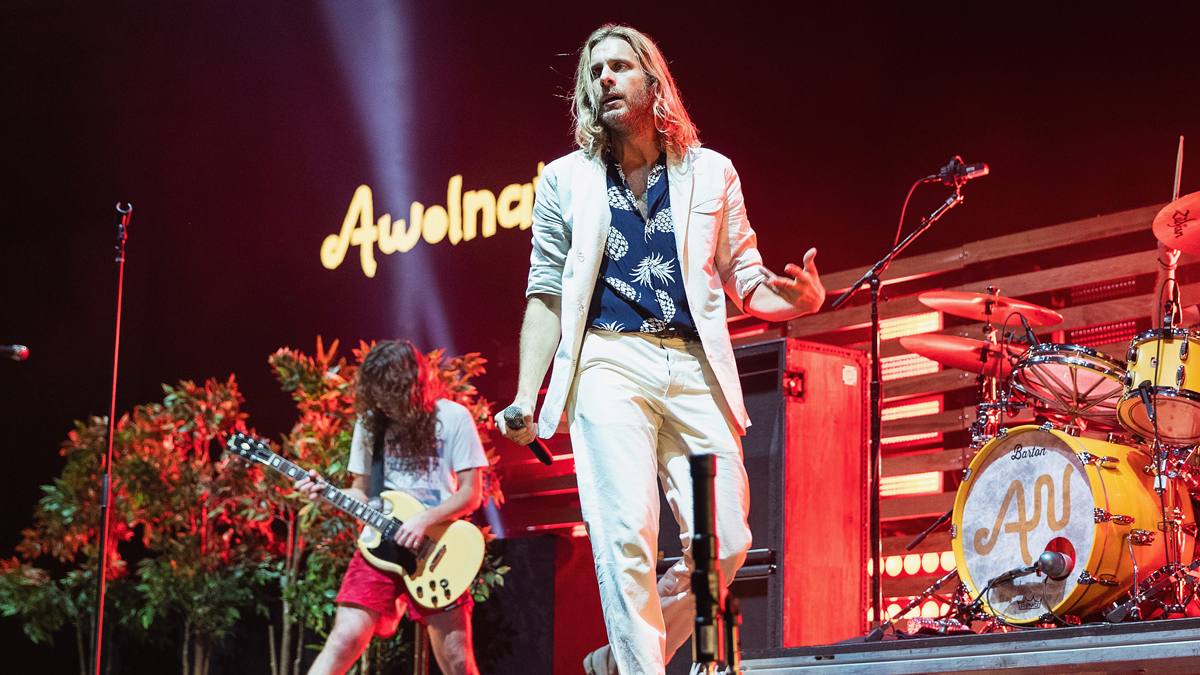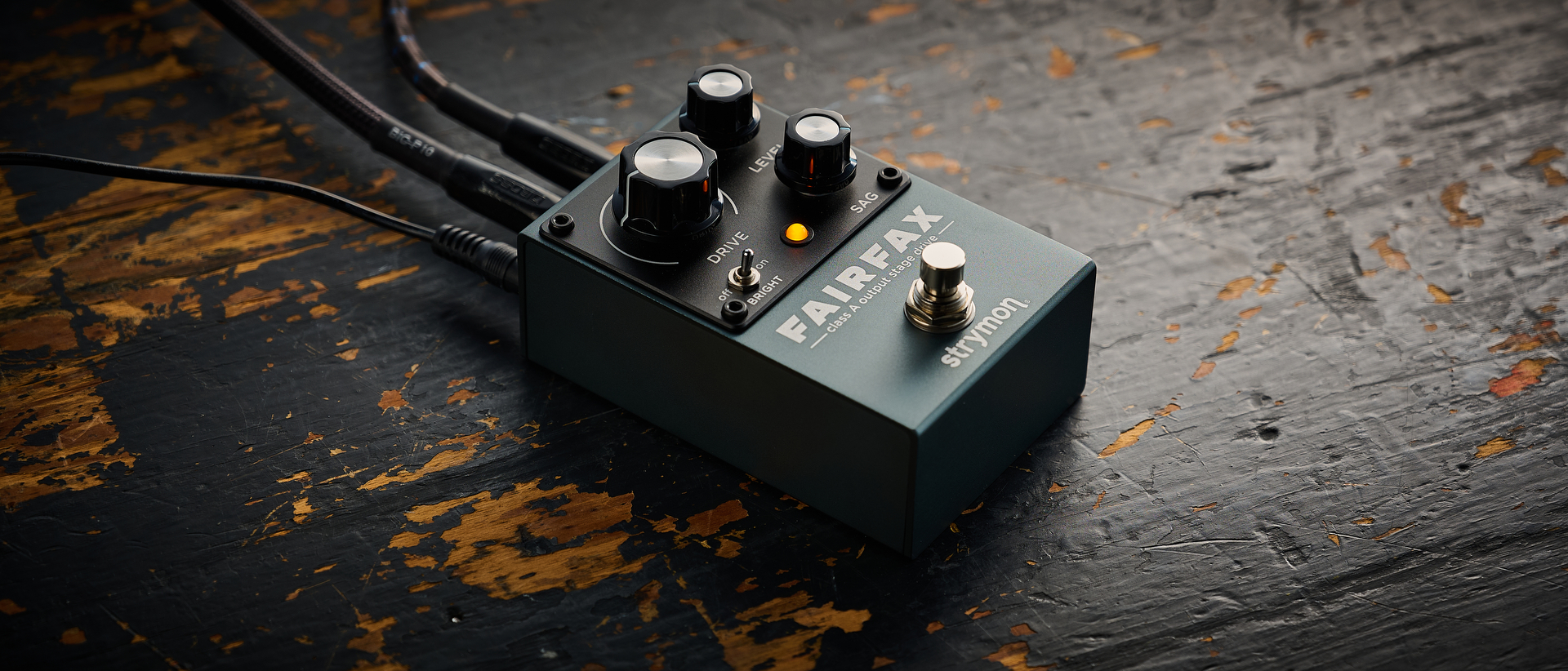AWOLNATION's Aaron Bruno shares his guitar and emotional journey, and reveals why, for him, "music is mental health"
The leader of the crossover rock act details his rocky road to success, how songwriting and guitar playing has helped him throughout his life – and how one of John Frusciante's Strats ended up on AWOLNATION's latest all-star covers album

All the latest guitar news, interviews, lessons, reviews, deals and more, direct to your inbox!
You are now subscribed
Your newsletter sign-up was successful
This article is part of GuitarWorld.com's series of interviews and features with artists addressing and raising awareness around themes of mental health, particularly as they relate to musicians.
Much has been written about the toll the pandemic took on musicians and their mental health, as tours came to a halt and the industry was placed on indefinite hold. Aaron Bruno, founder and songwriter of the chart-topping, platinum-selling AWOLNATION, wasn’t immune to the depression and anxiety that affected a multitude of artists.
He never lost his passion for music, but he had no desire to write new songs. Instead, he opted to assemble friends and colleagues to record a covers album, My Echo, My Shadow, My Covers and Me. The 11 tracks feature a range of guests – among them Beck, Jewel, Portugal. The Man, Taylor Hanson of Hanson, and Brandon Boyd of Incubus – joining Bruno on an unlikely selection of classics ranging from Madonna’s Material Girl to Scorpions’ Wind of Change.
“It was a fun way to get through lockdowns and stay connected with other artists, and it was something I always wanted to do,” he says. “Music has always been where I go, ever since I was a little kid. It's the only thing that I know that is somewhat of a parallel to religion and spirituality. It's the closest thing I could find, in that it has always been my place of escape and therapy.”
Gear first. Which guitars did you use on Covers?
“I used to play a lot of guitar on my records until I met my guitar player, Zach Irons. He’s wonderful. I rely on him in a lot of ways. He's a disciple of John Frusciante. They’re buddies, and he grew up learning from John, as I understand.
“There's this old Strat that John gave Zach that we usually use on any parts that Zach plays on. But if I want a thicker, warmer sound, I personally – and this is controversial – lean more towards Gibson. If we want something that's going to poke through a little bit more and a little brighter, we go with a Strat. It's really that simple.
All the latest guitar news, interviews, lessons, reviews, deals and more, direct to your inbox!
“I am not good enough to play a Fender Stratocaster. I sound ridiculous, brittle, and it points out my clunky hands, but somehow when I play Gibson SG, which is my favorite guitar, I find that I can hide behind an octave pedal or a fuzz. That's my secret: because I lack talent on guitar, I'm able to hide behind the warmth of a Gibson little bit better.”

Fortunately, your self-alleged lack of talent on guitar does not stop you from playing or writing.
“I've found that my lack of talent on guitar has helped me write the songs that I write, so it's never bummed me out. Growing up, when I first touched a guitar, I was more interested in being able to play and sing than I was in shredding a solo, because it didn't seem in the cards for me.
“A lot of people, with discipline and hard work, can get to certain heights of 'shreddage', but for me, it was going be a lot harder, so I opted out and thought, 'I’ll just learn the regular chords so I can play Nirvana songs and things of that nature.' That felt like a more realistic path.
“So I never became a master at guitar, like Zach. Rather I got excited about songs in general, and production, and listening to music. I think the more songs you hear, the better you become as a songwriter and as a fan of music in general.”
One of the reviews calls My Covers “an energetic, fun, and compulsively listenable set.” With that, let’s start with a classic song about grief, isolation, and suicidal thoughts, which rose to the top of the pop charts via a catchy melody and upbeat vocal. Obviously that is Alone Again (Naturally). It’s such a great song, and it could be a theme song for mental health awareness.
“I feel the same way about it. That was the most challenging song to cover because it's probably pound for pound the best song on the record. Not my version, but if you had to vote on what the best song was in its original form, it's certainly that one, without a doubt, so it was hard to do. Diving into those lyrics – I encourage anyone who reads this interview to check out the lyrics. It says it all. I like to let stuff speak for itself as much as possible, and what a heavy thing.”
You’ve done some work with the Jed Foundation. How did you become aware of them?
“I am friends with [singer/songwriter] Elohim, who sang on this record. Everybody has different varying degrees of mental health, and she has always struggled in such a profound way. Her journey is very inspiring because she has crippling anxiety, if I can speak for her, which I think I can because I feel we're good enough friends.
“I've always wondered how she deals with it, and it's mostly through music. She connected me with the Jed Foundation. I’m not an expert on anything in life, let alone mental health, so it's sort of a default position, but it all goes back to her.”
How does music help with your mental health?
There were times over the last two-plus years that it just felt so bad, and so I started playing music. It's what I always do, and I feel lucky that I've found something like that
“It serves me pretty well. During the pandemic, I would do these little concerts at night for my wife and our two rescue dogs, Billie and Sallie. What I mean by that is they were all doing their own thing and I just happened to be in the room, playing songs. It helped keep the hope alive. There were times over the last two-plus years that it just felt so bad, and so I started playing music. It's what I always do, and I feel lucky that I've found something like that.
“I think life in general is about mental health. Once in a while, you'll meet someone who seems to have it all figured out and who is uplifting and positive. I've often been jealous of those kinds of people.
“But music, for me, is mental health. Music is everything. A simple pop song about dancing can make you feel a little better, if it makes you dance or laugh or celebrate. I've always found that sad songs make me feel better. Even if it feels like a heavy tidal wave of sadness that crashes over me, once I'm done with that, I feel better, I feel reset, and I feel like I'm not alone. I’ve got a best friend to help carry me through – that's music for me.
“Some people like music, but they don't love it, or seek it out, or study it. They go with the flow, and whatever's on the radio is fine for them. I feel lucky to have had this love affair with music from such a young age.”
When did that love affair begin?
“It was probably because of my mom. She took us to school and Little League baseball practice and all those activities, and the radio was always on in the car. When I was 12 or 13, I started to understand punk rock, hardcore metal, and hip-hop, which were underground genres at that time. But growing up, it was whatever was on the radio, and there was some good stuff – George Michael, Prince, Madonna, and so on.
“I remember a distinct feeling about sad chords and how good they would make me feel if done in a certain way. The relationship between major and minor chords, going back to guitar, you can feel a sense of sadness and melancholy that takes you through this whole journey. It’s like watching an incredible movie, but a song can do that in three minutes. What more could you want?”
Prior to the pandemic, did you experience mental health challenges?
I got a couple of record deals before AWOL and those ended up failing pretty epically. I'm grateful that I had those opportunities
“Yes. My whole journey, the timing of my career and my path, hasn't been normal. The people around me always showed support that maybe there was something worth pursuing with music, because I had decent ideas that seemed worth giving a go.
“I got a couple of record deals before AWOL and those ended up failing pretty epically. I'm grateful that I had those opportunities, but there's something about being handed the opportunity and it failing that is pretty heavy and was certainly devastating. I put all my eggs in one basket and I didn't have a backup plan.
“I took a couple classes at a junior college, but I didn't have a college plan. I didn't have another career path. I just knew music. I loved music so much, and continue to, and understand it so much – at least I think I do – that I felt like somehow I would land, whether it was writing songs for someone else or getting into engineering or producing.
“It was a stubbornness of passion towards music that I felt like it was going to work out. I had no idea it would work out this good, but having been given all the hope in the world and then failing two or three times fairly miserably, and then being broke, couch-surfing in friends’ places, and the whole sob story, a lot of anxiety and depression came with that disappointment. But that's life.
“Fairness isn't baked into the cake of life. Part of life is the devastation – losing loved ones, getting your heart broken, et cetera. I'm not an expert to speak on any of this, really. I just do it through music and lyrics.”

What got you through?
“Even at the darkest times, I had such a good relationship with my parents. I must give them credit. Amongst all the hell that I was dragged through – and some of it by my own doing – my parents were always so supportive, and my dad always seemed to have an answer to a lot of the questions of life. I don't know if I would have survived had I not had that lifeline to call.
“And so while I did have a lot of failure and a lot of things not go my way, that beacon of information and hope and wisdom – the older I get, the more I realize how lucky I was and still am today. But yeah, it got low. It got dark. In my twenties I was just navigating what to do and how to do it, and how to figure out some sort of career path through music. When you're younger, you still are hopeful that everything's going to work out. But once I turned closer to 30, right around when AWOL took off, it was definitely headed towards complete failure in a lot of ways.
The heaviest, most punk rock thing anyone's ever said to me, and it's very, very hard to follow, came from my mom: 'Joy is an option'
“It was only then that I let go, started my own thing, and thought, 'I'll give it all I’ve got with this weird idea and make the music I've always heard in my head but couldn't quite create properly.' And then it took off.”
Was that also an adjustment?
“I wasn't able to really recognize it until the last three years. It was hard to understand why or how it was all happening. It's kind of an out-of-body experience to hear your songs played in certain ways. For example, I'm a big Raiders fan, so I'm watching a Raiders game and I'll hear one of my songs during a commercial break. Or I’ll hear one in the local grocery store while I’m shopping. It’s weird when you're not expecting it, but it’s always a nice reminder of how lucky I have been. I don't take that for granted.”
Do you have some closing thoughts for readers who are struggling with mental health challenges?
“Anything I say will sound somewhat cliche, but you're not alone. The heaviest, most punk rock thing anyone's ever said to me, and it's very, very hard to follow, came from my mom: 'Joy is an option.' I try to remind myself of that in the worst scenarios possible.
“It's hard. Maybe it's impossible. Maybe it's even not true. But I like to live in a world – in my head, at least – where that's attainable … sometimes. If you were to meet my mother, you'd see what I'm saying. She's this ball of positivity. She says that to me and it blows my whole world apart.
“Again, I don’t want to suggest that I know anything, because I don't, but my experience has been that there's different degrees of life situations and different thresholds of pain, so there's no one answer, obviously. But chances are someone's gone through what you're going through, and has had similar emotions, and you're not alone.
“Look at where we are today versus when I was in high school in the '90s. If I had talked about feeling insecure or depressed or having anxiety back then, I would have been beaten up or made fun of. We've come a long way. We have a long way to go, of course, but now we have information and conversations. I'm trying to look at this as the glass half-full, like my mom would, because before, it would have been, 'I feel weird, I feel strange, I feel alienated… and I'm alone again, naturally.'”
- My Echo, My Shadow, My Covers & Me is out now.
Mental health resources
Alison Richter is a seasoned journalist who interviews musicians, producers, engineers, and other industry professionals, and covers mental health issues for GuitarWorld.com. Writing credits include a wide range of publications, including GuitarWorld.com, MusicRadar.com, Bass Player, TNAG Connoisseur, Reverb, Music Industry News, Acoustic, Drummer, Guitar.com, Gearphoria, She Shreds, Guitar Girl, and Collectible Guitar.
